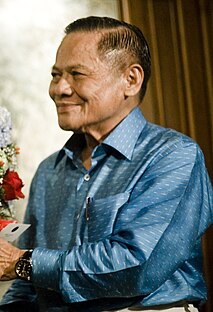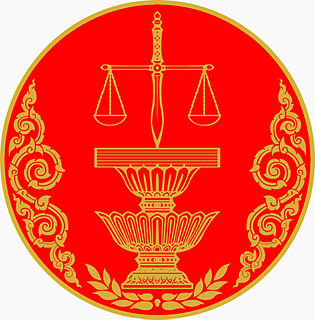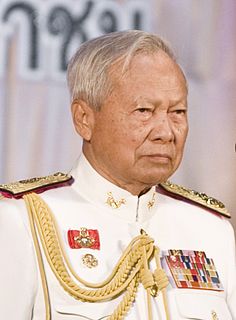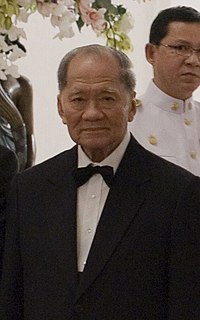 W
WNetwork monarchy is a political network involved in active interventions in the political process by the monarch and his proxies in constitutional monarchy system in Thailand. The monarch works with and through other political agencies, such as the elected parliament, and the consensus among the Thai elite is essential. The ideology is generally situated within right-wing politics, but may take on liberal features.
 W
WThe 2006 Thai coup d'état took place on 19 September 2006, when the Royal Thai Army staged a coup d'état against the elected caretaker government of Prime Minister Thaksin Shinawatra. The coup d'état, which was Thailand's first non-constitutional change of government in fifteen years, followed a year-long political crisis involving Thaksin, his allies, and political opponents and occurred less than a month before nationwide House elections were scheduled to be held. It has been widely reported in Thailand and elsewhere that General Prem Tinsulanonda, Chairman of the Privy Council, was the mastermind of the coup. The military cancelled the scheduled 15 October elections, abrogated the 1997 constitution, dissolved parliament and constitutional court, banned protests and all political activities, suppressed and censored the media, declared martial law nationwide, and arrested cabinet members.
 W
WBanharn Silpa-archa was a Thai politician. He was the Prime Minister of Thailand from 1995 to 1996. Banharn made a fortune in the construction business before he became a Member of Parliament representing his home province of Suphan Buri. He held different cabinet posts in several governments. In 1994, he became the leader of the Thai Nation Party. In 2008, the party was dissolved by the Constitutional Court and Banharn was banned from politics for five years.
 W
WThe Constitutional Court of the Kingdom of Thailand is an independent Thai court created by the 1997 Constitution with jurisdiction over the constitutionality of parliamentary acts, royal decrees, draft legislation, as well as the appointment and removal of public officials and issues regarding political parties. The current court is part of the judicial branch of the Thai national government.
 W
WThe People's Alliance for Democracy (PAD) is a Thai political movement and pressure group. It was originally a coalition of protesters against Thaksin Shinawatra, the former Prime Minister of Thailand.
 W
WPrem Tinsulanonda was a Thai military officer, politician, and statesman who served as the Prime Minister of Thailand from 3 March 1980 to 4 August 1988, during which time he was credited with ending a communist insurgency and presiding over accelerating economic growth. As president of the Privy Council, he served as Regent of Thailand from the death of King Bhumibol Adulyadej on 13 October 2016, until the 1 December 2016 proclamation of Vajiralongkorn as King. At the age of 98, Prem was the longest-living Thai Prime Minister.
 W
WThe Privy Council of Thailand is a body of appointed advisors to the Monarchy of Thailand. The council, as the Constitution of Thailand stipulates, must be composed of no more than eighteen members. The council is led by the president of the Privy Council of Thailand; currently occupied by former Prime Minister Surayud Chulanont since 27 May 2019. The king alone appoints all members of the council. The council's offices are in the Privy Council Chambers, Phra Nakhon District, Bangkok.
 W
WSirikit (Thai: สิริกิติ์; Thai pronunciation: [sì.rì.kìt]; listen ; born Mom Rajawongse Sirikit Kitiyakara is the Queen mother of Thailand. She was the queen consort of King Bhumibol Adulyadej and is the mother of King Vajiralongkorn. She met Bhumibol in Paris, where her father was Thai ambassador. They married in 1950, shortly before Bhumibol's coronation. Sirikit was appointed queen regent in 1956, when the king entered the Buddhist monkhood for a period of time. Sirikit has one son and three daughters with the king. Consort of the monarch who was the world's longest-reigning head of state, she was also the world's longest-serving queen consort. Sirikit suffered a stroke on 21 July 2012 and has since refrained from public appearances.
 W
WSonthi Boonyaratglin is a Thai former Commander-in-Chief of the Royal Thai Army and former head of the Council for National Security, the military junta that ruled the kingdom, of Iranian descent. He was the first Muslim in charge of the army of the mostly Buddhist country. On 19 September 2006, he became the de facto head of government of Thailand after overthrowing the elected government in a coup d'état. After retiring from the Army in 2007, he became Deputy Prime Minister, in charge of national security.
 W
WThe Supreme Court of Thailand, located in Bangkok, Thailand, is the highest Thai court of justice, covering criminal and civil cases of the entire country. Operating separately from the Administrative Court and the Constitutional Court, the judgment from the Supreme Court is considered as final. Neither plaintiff nor respondent can request for any further appeals.
 W
WSurayud Chulanont is a Thai politician. He was the Prime Minister of Thailand and head of Thailand's interim government between 2006 and 2008. He is a former supreme commander of the Royal Thai Army and is currently Privy Councilor to King Vajiralongkorn.
 W
WThanin Kraivichien is a Thai former judge, politician and law professor. He was the prime minister of Thailand between 1976 and 1977. Subsequently, he was a member of the Privy Council until 2016 when he was appointed the position of President, replacing Prem Tinsulanonda.
 W
WThirachai Nakawanich is a Thai military officer who served as Commander-in-Chief of the Royal Thai Army from 2015 to 2016. He succeeded Udomdej Sitabutr, with whom he has had a long-running feud, and whose preferred successor would have been Preecha Chan-ocha, brother of Prime Minister and NCPO chief Prayuth Chan-ocha. He was succeeded in 2016 by General Chalermchai Sitthisart upon reaching retirement age. In December 2016 he was appointed to the Privy Council by King Vajiralongkorn, but was relieved of his duties in June 2018 for unspecified reasons.